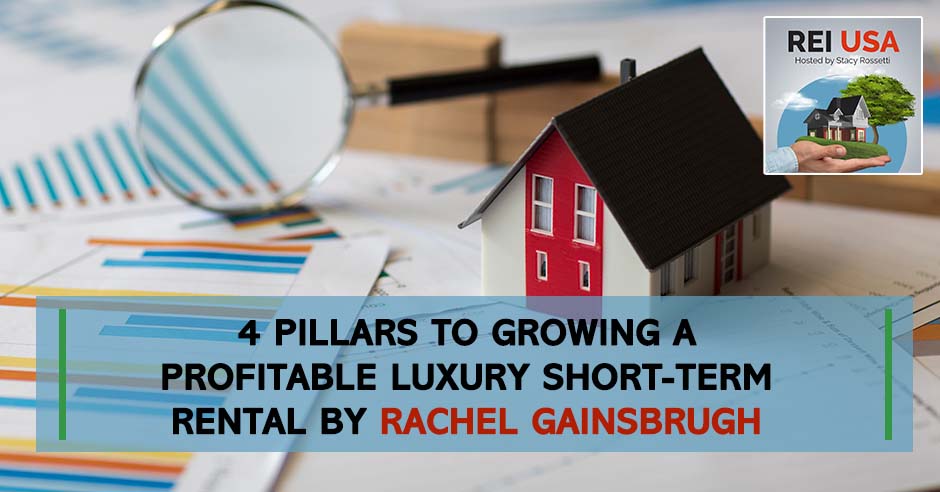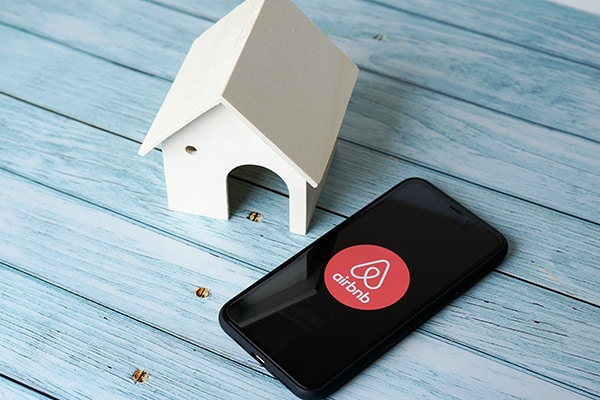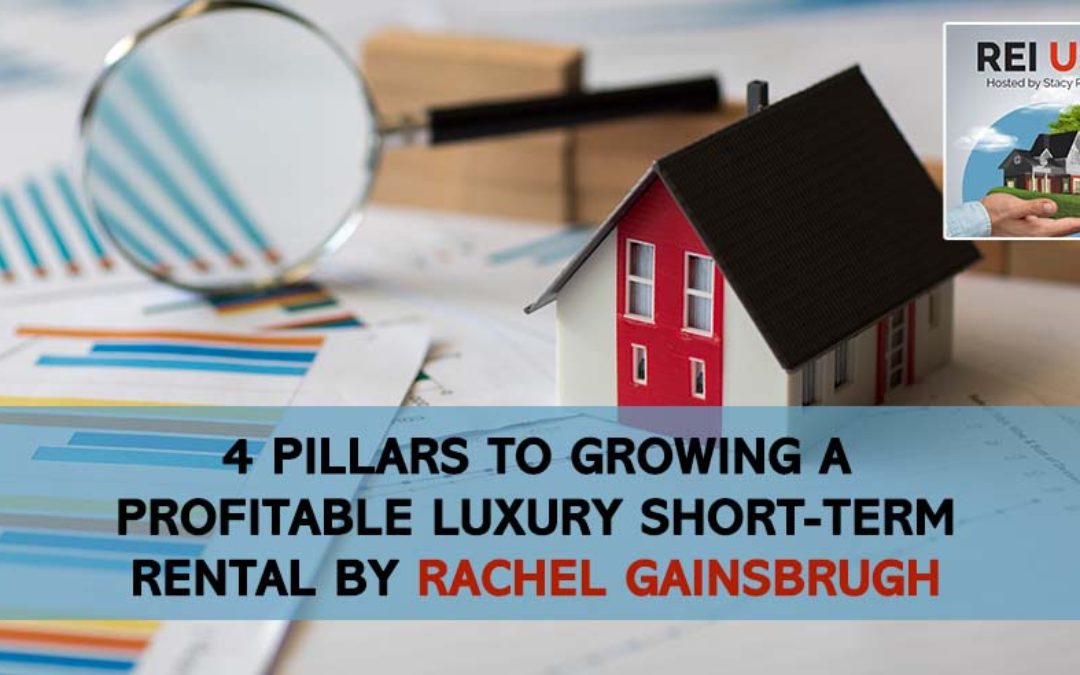
What does it take to grow a profitable luxury short-term rental? Rachel Gainsbrugh, a short-term rental host who owns investment properties in Georgia, Florida, Tennessee, and Pennsylvania, speaks to us about this in this episode.
Rachel discusses how to systematically and quickly identify the top 10% most profitable luxury short-term rental markets within your budget (including properties in non-vacation rental markets) that will be profitable on Day 1. She also discusses an acquisition strategy that focuses on quality instead of quantity; how we can own and operate the fewest number of properties that generate the highest profitability; and team and automation resources for hosting remotely (including the most important team members to source, technology stack, and checklists).
Discover four great freemium short-term rental tools that will help you in your journey into real estate. Become a master in your field today!
—
Watch the episode here
Listen to the podcast here
4 Pillars To Growing A Profitable Luxury Short-Term Rental By Rachel Gainsbrugh
My name is Rachel. I am a healthcare professional by day, a luxury short-term rental investor by night, operating out of Georgia, Florida, Tennessee, and Pennsylvania. One of the things I get asked on a day-to-day basis in terms of short-term rentals is, “Where to invest? How do I figure out and how much a property will make?” Now I will share with you my four pillars to growing a wildly profitable luxury, short-term rental portfolio.
I’m one of the last speakers. I hope that you can shake off any fatigue so that we can get going. I want this to be as interactive as possible. Stacy, if it’s okay with you, I do not mind taking questions in between because I’m sure there are questions that are going to come up. You are going to see a little bit of my analytical side during this talk. I don’t want to leave anyone behind. Feel free to go into the Q&A, ask your questions there, and I am more than happy to pause and take those.
Here are my four pillars. I’m going to give you an overview, and we are going to deep dive. This is our agenda. My four pillars of going a wildly profitable luxury short-term rental portfolio are I do grassroots research. I leverage, and this is something that Stacy knows about me. I leveraged out of my W-2 to make sure that I could get cheap money affordable loans.
It’s important to know your numbers. If you are not investing correctly and you don’t understand your numbers. You may find yourself on the unfavorable side of the deal and then understand my exit strategies even before I go in. What is the liquidation process going to look like before going in and putting money down? That is key.
Grassroots Research
There are different ways to exit when we are talking about short-term rentals, and the exit strategy can be a long-term rental. Let’s talk about grassroots research. What I love about short-term rentals, Airbnb, Vrbo, Booking.com is all the information is out there for the world to see. There’s no guessing. How much would it cost to rent a property at a nightly rate in Atlanta? Go in there as though you are an end-user and a guest. You can test some things out. That’s where I started before I started utilizing more sophisticated data tools. You can do your own grassroots research.
If I’m looking to break into a new market, I’m not familiar with it. I don’t miss they want to pay for the data tools to go in there, go all in and deep dive, yet. I use grassroots research. I will go into a neighborhood in, let’s say, Montana and pretend I’m going to book. If I see for the span of 3 or 4 days during the weekday versus during the weekend, here are the prices that they are demanding. That is fairly straightforward to do. I implore you to use your grassroots research using Airbnb and Vrbo. That is a great way to start.
OTAs are online travel agencies. Some other online travel agencies are Booking.com, that’s a third big one. Airbnb and Vrbo are OTA. Booking.com is one as well. Expedia and Travelocity, all of those, are OTA. Here is an example. This is Black Bear Mountain, a 70-mile view, one hour from Atlanta. This area is remote. You can go in and do grassroots research. You see that for that time that I selected. They are charging about $200 a night. A little less, $131, $183. This is something you can do immediately.
I implore you to do your grassroots research. It’s a great way to get started. It’s something that is pretty obvious but I want to put it out there because not a lot of people are doing that grassroots research when they are first getting started. Do your grassroots reach out. Not only does it give me the average nightly rate but it also gives me this density.

Luxury Short Term Rental: When people decided to be entrepreneurs, they go and burn all their boats. Don’t do that. Leverage your W-2 to get some of the best loans possible.
Leveraging
Look at all these short-term rentals and Airbnb listings in this area. This is not Airbnb. This is Vrbo. What that tells me is there is a demand in that area. There are quite a few short-term rentals in that area. It might be an area worth looking into if I’m interested. Do your grassroots research. The next thing that I wanted to talk to you a little bit about is leveraging.
A lot of times, when we decide to be entrepreneurial, some of us decide, “I’m going to go ahead and burn all the boats.” There’s nothing wrong with that. Maybe it’s a crutch or an advantage but I found that utilizing my W-2 in the work history has given me an opportunity to get some of the best loans possible, 5%, 10% or 3.5% down. At times, it depends on the lender and how they determine.
Is the home a second home loan? Is it different from your primary home? I leverage my W-2, which is a little bit of a contrarian because I know a lot of us investors are small business owners, and we don’t always have a W-2. I encourage you. If you have a W-2, leverage your W-2 because it gives you an opportunity to use some of these cheaper loan options.
I’m not an attorney, and I’m not a financial advisor or an accountant. I can’t give you financial advice. Reach out to those that are on your team, whoever gives you counsel for your finances to ensure that that is a good idea if you have a W-2 but this is what I have done. I have leveraged other people’s money in terms of second home loans. I have leveraged commercial loans, such as the DSCR loans, which are the debt service coverage ratio loans to get 15% down as well.
I know that we have hard money lenders that we have spoken to. We may leverage those as well. Arbitrage is another way of leverage. This is when you are leveraging other people’s property to other people’s homes. This is something that I found to be a big trend in 2021, especially when the prices went all the way up, and we were not necessarily purchasing homes month after month.
What we did was we transitioned to an arbitrage model where we rented. It’s a rent to rent or, in some areas, it’s called a sublease, master lease, rent to rent, sublet, where we hold the property in our business’s name to rent it out to travelers who are coming to the area. The owner is still getting their monthly rent. They are fully aware of the business that we are running on the property, and we give them their monthly rent scheduled to automatically pay them on a month-to-month basis on time.
However, a property gets furnished by us. Cleaners come in 6 to 7 times a month. The property is in tip-top shape. The owners love us because how often do you go back to your single-family home or your property after 1, 2 or 3 years, a tenant living there, and you often have to do a gut job because it was not the most well cared for. That happens sometimes.
In order for me to stay in business, to remain a five-star host, and to continue to provide those five-star accommodations for my guests, that property needs to be in a showroom ready each and every time. Whenever the owner decides, “Let me go ahead and check in on this property. It’s vague.” There’s no occupant there at the moment. They go in, check, and the property is in the showroom ready. It’s in perfect shape.
[bctt tweet=”Know your numbers and exit strategies. If you’re not investing correctly, you may find yourself on the unfavorable side of the deal.”]
We love working with investors as being investors ourselves. They understand what it is that we are doing. This is our second pillar. We leverage by using other people’s money, whether it’s second home loans, debt service coverage or ratio loans, as well as other people’s properties as well. Anything from single-family homes, multifamily apartments, and so on. I covered two pillars. I wanted to see if there are any questions before I move on to my know your numbers pillar.
DSCR Loan Question
What are the qualifications, and how does one apply for a DSCR loan?
We have different DSCR lenders out there. What’s interesting about DSCR loans or Debt-Service Coverage Ratio loans is that it’s not your Fannie Mae or Freddie Mac. It’s not going to have the same qualifications as those institutional lenders. I’m happy you asked that question because that is a great question.
Each DSCR, the retail lender, is going to have different qualifications, for example. If you want the best of the best DSCR loan, meaning if you want the 15% down, which is going to be the lowest possible, some are 20%, 25% or 30% down, you will still get that loan but the LTB is going to be different. Let’s start with 30% down. If you are going to get a 30% down, as long as you do not have a derogatory credit score and the property can generate revenue, you can get that 30% down. That’s the lowest-hanging fruit.
They are not looking for your income. They are more looking for the income potential of the property. At that point, you don’t have any short-term rental experience and you have a decent credit score. It’s not the top credit score. You are a small business owner but when you have your 30% down, you can get the DSCR loans. I wanted to start there.
If you are looking for the prime everything, the 15% down, the lowest possible interest rate, and the interest rate are going to be higher than your Fannie Mae and Freddie Mac. It’s going to be anywhere from 4.5% to 5% is the interest rate. It is higher. You want to leverage a Fannie Mae and Freddie Mac if you can if it’s appropriate for your finances but the best ideal client for a DSCR loan like to get the best DSCR. Here’s what I have seen, and don’t quote me because each lender is different.
If you have one year of Airbnb hosting experience, they will take the revenue from your short-term rentals. It has to be a 1:1 ratio, and they will cover the loan at 15%. Also, your credit has to be 720 or higher, and then you can get that 15%. You being an Airbnb host, they will take your Airbnb revenue. Typically, commercial lenders or hard money lenders want to see that the house is going to rent for the monthly mortgage or for the monthly amount that you owe them.
However, with DSCR loans from specific lenders, they will take your Airbnb or your short-term rental revenue, which is usually about 3X a long-term rental revenue. I hope that answers were your question. I went all the way around the world and back. The reason I interviewed an FHA and DSCR loan person is that these are the questions that we are getting all the time. What if this is my situation? What if everyone’s situation is a little bit different? I’m sure I did not cover all of the situations but that’s more of a high level.

Luxury Short Term Rental: If you have one year of Airbnb hosting experience, the DSCR lender will take the revenue from your short-term rentals. It has to be a one-to-one ratio and then they will cover the loan at 15%.
Short Term Rentals Tools: AirDNA
I’m sure Stacy talks about this every week when she’s doing her live webinar. Knowing and understanding your numbers. You are after ARV, and all of that is important. For short-term rentals, I want to show you the tools that I use to know my numbers. These are my four favorite tools that I utilize to make sure that I know my numbers and it makes sense.
My four favorite tools are AirDNA, Data.rabbu, PriceLabs, and Rentometer. We are going to talk about that. Let’s talk about it. You can go and search AirDNA.co/AirbnbCalculator or you can even search Airbnb Rentalizer in Google. Once you search, it may ask you for your name and password. Stick to the free version for now but once you search, what you want to do is enter the address. Enter the number of bedrooms the property has.
I would say, give this a go. Enter an address. You can do your home address or an address on a property that you found from a wholesaler. They sent you the property. You can plug and chug that address in there. Enter the number of bedrooms, bathrooms and enter your number of expected guests. Here’s how we know the number of guests we expect. My rule of thumb is about three guests per bathroom.
Let’s say it’s a 10-bedroom home with 2 bathrooms. I have seen weird things like that before. Typically, I would say it would be three guests per bathroom. That property, I would feel comfortable. Putting in six guests but since there are so many homes, I may up it to four guests per bathroom because there are going to be a lot of real estates there. People can roam, especially if it’s a beachfront property.
They are probably going to be spending more time outside than on the property. The number of bathrooms is what determines my number of guests. My rule of thumb is 3 to 4 guests per bathroom. That’s going to help you fill out this third field here, the number of guests. I googled a property in Vail, Colorado. Here is the annual revenue for all of the properties in Vail, Colorado, whether it’s a condo with the ski lift or a house that’s all the way remote, nowhere near amenities, and it’s two bedrooms.
As long as it’s a 2-bedroom, it can sleep 6. This is the average revenue. This is the average daily rate but honestly, I want you to come back to me. If you are multitasking, come back to me. The most important thing for me is the occupancy rate. All I’m looking to see using this particular tool, the free AirDNA Rentalizer. Is there a demand in there? Are you people even coming to that area? My secret sauce number is 50% or more.
If it’s 50% or more, I know that there’s a demand. That’s all it’s telling me. It’s not telling me what my property is going to generate in terms of occupancy because I can generate as little as 65% is what we generate for the bigger properties or as small as 90% is what we generate for smaller properties. Fifty percent or higher tells me one thing. There are people traveling to the area.
I had a mentee of mine with a beautiful home. Where was this? This was in Georgia. They found this beautiful home, newly renovated. I even went to take a peek at it. I was like, “This is pretty.” There were some gaps in the renovation but it was a great home. Seven bedrooms on 0.5 acres, it was near Hogansville, Georgia. When we pulled the occupancy rate, it was at 23%.
[bctt tweet=”You don’t necessarily want the revenue scores for an entire city. You want the revenue scores for properties that are within walking distance from you.” username=””]
My record recommendation was not. We are not going to move forward. My recommendation was that this would be called a high-risk investment for short-term rental because at 23%, it’s like, “Who even is coming here? What is the drive? What is the purpose for guests to come and visit this area?” There was not much purpose and drive. My recommendation was that this is a very high risk. You can move forward but know that this is high risk. I was concerned. We did not move forward with that investment.
I don’t mean to go on and on about it but I do because it is that important. I’m only sharing with you tools that are free or freemium. For the most part, there’s one that does cost but in general, they are free. What I love is when you have one tool that validates the other tool but if they are in conflict with one another. I like to use a third tool as a tie-breaker.
Short Term Rental Tools: Data Rabbu
The next tool that I love is called Data.rabbu. We looked in the picture a little bit earlier to see globally what the occupancy rate and the general annual revenue are for an entire area within a certain mileage. Data.rabbu helps us to get laser-focused. My subject property, 0.1, 0.2 or 0.3 miles away, what is the revenue being generated, the occupancy, and the daily rate for those properties? That’s very important to get laser-focused.
Also, plug it into Data.rabbu because you don’t want necessarily the revenue scores for an entire city. You want the revenue scores for walking distance from your property so that you can get laser-focus. Data.rabbu is a great way to zoom in. It’s another free tool. It is a great tool, and I love using it as well. I use it on a daily basis if I’m looking at property.
Another pointer also is if you go to the arrows, it will send you to the Airbnb listing. It will share with you what the calendars are looking like for all of the potential properties that are in the surrounding area. It will show you what’s blocked on the calendar and rates on a day-to-day basis, Thursday, Friday, and Saturday versus Sunday, Monday, Tuesday, and so on.
Another thing that I like to use with this tool is that the operator is using some type of dynamic pricing tool or are they pricing it $100 a night and then on the weekends, it’s $200 a night. When I see the fluctuations such as $137, $183, random pricing, I’m like, “This is someone who knows what they are doing because they are utilizing a dynamic pricing tool.” It’s a tool worth looking into, Data.rabbu.com, another free tool.
Short Term Rental Tools: Price Labs
PriceLabs is a final short-term rental tool that I will share with you now. Mashvisor is another one, too. Mashvisor and PriceLabs have a freemium version but to get more robust information and I call it freemium because you get a little bit but then you pay, you get more. I use PriceLabs as a tie-breaker. If AirDNA is telling me one thing and then Data.rabbu was telling me the total opposite, that I may enlist a third because I need a tie-breaker to give me a little bit more information before moving forward.
PriceLabs originally is the dynamic pricing tool that I use for all of my properties. I’m letting you know. I’m spilling the tea. Dynamic pricing, you will see if you look at any of my Airbnbs or short-term rentals, there are no two prices that are the same. It takes into consideration holidays, events that are going on, hotel occupancy rates, hotel vacancies, neighboring property vacancies, and neighboring property occupancy to price my property on a day-to-day basis. The algorithm does that on a day-to-day basis for me.

Luxury Short Term Rental: The most important thing about AirDNA is the occupancy rate. You need to know if there is a demand or if people are even coming to that area? And, you at least want a number that is 50% or more.
Short Term Rental Tools: Rentometer.com
The next tool I want to share with you is something and I’m going to speak about this twice. I may go ahead and share Rentometer.com, and then I will speak about it. Many of you should know about this tool. It is a tool that I use whenever I go into investing in short-term rentals. I want to know that I have an exit strategy. Let’s say something goes wrong, unfortunately, and I can no longer operate as a short-term rental investor with that property, and rather, I would need to pivot into a long-term rental. As I’m analyzing the property for short-term rentals, I believe that I’m also analyzing it for the long-term as well.
Insurance For Property & Medium-Term Rentals Questions
Somebody asked this question, “What insurance do you use for properties? I understand some of the larger companies don’t like to ensure Airbnb properties.”
For the ones that we are arbitraging, I use Proper Insurance, and for the ones that we own, I use vacation rental insurance. You can ask your insurer if they have vacation rental insurance and use that. That’s what’s pretty much worked for us. It’s like a Lloyd’s of London or something.
Lloyd’s of London does everything because they also do storage. We are like, “We will ensure it. No big deal.” Eric is asking, “Do the free sites you touched on have data for medium-term rentals, 30 days are more?”
They don’t identify them because it depends.
Linda says, “Lloyd’s of London also does flood insurance.” I think Lloyd’s of London does everything.”
It does require a little bit of grassroots because most short-term rental hosts are also medium-term rental hosts. It depends. You can look at the property, and you can identify it, especially on Data.rabbu. If the property is booked for the next 30, 60 or 90 days 100% booked, most likely that property is a medium-term rental or maybe they have taken it the listing down for a number of months for whatever reason.
If it’s locked for 30, 60 or 90 days and if it’s generating revenue, that property is a medium-term rental. You can go ahead, look at those numbers and identify them that way but as far as a database, that’s going to tell you, in terms of these are medium-term rentals. I have not seen that come across yet. Not to say that that won’t come up in the future because Airbnb, short-term rental, medium-term rentals are so hot.
[bctt tweet=”When analyzing a property for short-term rentals, also analyze it for long-term as well.” username=””]
There’s always a new data tool out there. I’m a data girl. I get excited when I see spreadsheets, believe it or not. I have subscriptions to twenty of their tools as well, Airbtics, Key Data, even apartment rental data, commercial property data. What I want to share with you all here are the bare minimum tools that you need to make a decision. You don’t need anything else, any of the other stuff I found to be lacking and be noise. I’m not telling you that these are perfect but these are more than enough to help you make an informed decision.
If there’s another tool that comes to market that is going to show us a little bit more about medium-term rentals, I’m here for it. I’m finding that data in Rentometer. I’m finding that data in AirDNA, as well as Data.rabbu. Between short-term rentals in Rentometer, the medium-term rentals fall somewhere in between. The other challenge you are going to find with medium-term rentals is sometimes you go off platforms. For example, if someone stays with me for two weeks and they say their house is on fire, and they are going to be staying with me for two weeks while they renovate. You all know it’s not going to take two weeks to do anything. You can’t put in a faucet in two weeks these days.
Unfortunately for them, it’s taken much longer. The first two weeks, that data was captured on Airbnb but thereafter, they did a direct booking with me. In other words, we went off-platform. We dealt directly with the insurance company, and they booked directly with me. They have a signed lease. They have been going month by month.
They go 30 days at a time with a deposit in the beginning. All of that is spelled out but where would you capture that information? I’m not in a unique situation. This happens a lot, where once you have served the guests, you end up going off-platform. Afterward, having a medium-term lease in place and then that data falls off.
The cashier’s check is coming directly. ALE Solutions is one of the companies that we work with. Signature Housing is another company. They will send me a cashier’s check. AirDNA and Data.rabbu, none of those platforms would capture that revenue on a month-to-month basis. I would not count on any platform per se for medium-term rentals. You can make some general extrapolations based on that. I went all around the world and back but I hope that offered some value.
Rentometer.com & Exit Strategies Continuation
We have talked about data tools. I can talk about data tools all day but it can get a little boring. Some people tell me my little data tools are boring but I love it because knowing your numbers are important. Let’s talk a little bit about exit strategies. You want to begin with the end in mind. We always hope for the best but we want to mitigate risk. We want to make sure, “If something goes down, what do I do?”
The Rentometer is your long-term rental tool. It’s freemium. It lets you analyze three properties for free and once a little monthly subscription, nothing too Earth-shattering. I want to say something around maybe $30 a month or less, something around thereabouts. If you are investing in real estate, $30 or less is worth the investment to make sure you are calculating your numbers and your expectations are set correctly.
If you are in a situation where you start as a short-term rental, the property needs to be converted to a long-term rental. You want to make sure you are ready. The other way I look at exit strategies is liquidation. In other words, selling off the property. I am of the mindset. I love equity and cashflow. I love both of those things. For me to be excited about a deal and to sign the papers, I’m want to see equity and cashflow. I hope that makes sense.

Luxury Short Term Rental: Rentometer is your long-term rental tool. It estimates what the property would generate as a long-term rental. The tool will let you analyze three properties for free before you have to start paying.
AirBnbs And Short-Term Are Hot
One of the biggest risks and trends that we are seeing now, and we will continue to see because Airbnb, short-term rentals, and Vrbo are hot. It’s a big deal. Unfortunately, the hotel industry took a $1 billion hit, $1 billion of losses in 2021. The hotel industry was expecting to make, they did not make. What it means is for the municipalities, cities, counties, that money they were counting on, the transient occupancy taxes, that revenue, they did not get all the revenue that they wanted or needed to get to keep their city up and running. It would behoove them to create legislation, regulations, ordinances to connect the funds from us Airbnb operators. Trust me, I pay my fair share. In order to collect correctly, they need to create ordinances.
I am optimistic. I believe Airbnb, short-term rentals, Vrbo, the vacation industry is here to stay. We are a money-generating industry. Every city, county, municipality, township, parish want their fair share, and that’s fine. In order to collect, they need to create ordinances. Before you purchase a property or you walk into anything, I need you to make sure you are looking at the ordinances because, in some areas, it is banned but in some areas, it is allowed or in some areas, there’s nothing. There are no rules there yet but there will be. That is going to be a trend. You need to understand at a high level what these rules mean.
Ordinances
Number one, if you don’t know at all, whether or not property, city, county or municipality has a ban or short-term rentals are allowable. Here is my framework. This is the step, workflow and this is what I do specifically. I wanted to map it out for you. You don’t need to do more than this but this is what you do. You go to Google, and you research short-term rental ordinances or regulations. Clayton County, Fayette County, Georgia, short-term rental regulations. Whatever county you are interested in, you look it up.
You are not looking for articles, this party happened here, that party something or slander, all of that is going to be out there. What you are looking for is what is called the Municode because what it does is it spell out the ordinance for you. If there’s no Municode or municipality code, and unfortunately, a lot of times, you are going to find there’s no Municode.
You need to do a little bit of digging. The way to do that is you call the County Clerk’s Office. Once you call the County Clerk’s Office, you ask the same question, “What is the short-term rental ordinance for such and such county.” They are going to tell you, whether there is or there are not any. The next question I want you to ask is, “Is there anything in draft?” There are a lot of things in draft. Once you ask if there’s anything in draft, you are going to want them to send you a copy of that via email. You can stop there if you are comfortable, “That’s what I need. That’s enough information for me. I’m good to go.”
However, if they say no, they don’t have anything in draft. The next step is I want you to go to the zoning department. It can be named different things in different locations. I think building and maintenance is one in some of the counties. The zoning department is who you want and you ask them, “What is the ordinance or the regulations for short-term rentals in such county?” You want that information from them because they are the ones who are the code people and enforcers.
I’m not a big fan, and I apologize if anyone hears here for zoning. Sometimes I feel like they do things under the cloak of darkness, and you find out about it the next day. No one spoke about this. You want to ask them. They are not the warmest and fuzzy. You may encounter someone a little bit tougher on the other side of the phone but remember you have rights. You are a citizen. They say, “What’s your address? What’s this?” If it gets to that type of a little bit more feisty, I would say, “I’m a citizen. I am asking about the ordinances. You don’t need to know my address and name. I’m a paying citizen.” You recenter the conversation to get what it is that you need.
I don’t know if it’s a badge thing but sometimes they can get a little dicey and feisty. We want to go ahead, recenter and get them to give us the information we need without indicting us. If he or she has nothing for you, then I would look at newspaper articles to see if the representative so and so is looking to bring forth this new ordinance, this new policy or something like that. You are looking for that type of news to stay abreast of what’s going on. Several of my mentees found out that there’s a new code coming out through the news in something general like that. Unfortunately, that happens from time to time.
[bctt tweet=”Before you purchase a property, always make sure you’re looking at the ordinances.” username=””]
HOA
It’s a little controversial that I put the HOA here. Sometimes I want to put it in the beginning, sometimes in the end but here it is this time. If you are dealing with a property that has an HOA, you a look at the CCNR. Here are my thoughts about HOA. I was the to say no to HOA like anti-HOA under any circumstances but I have updated my mindset and process. I’m still to say no to HOAs if you are in a suburban area. However, if you are fortunate enough to be buying a property in a nice resort, they are going to have an HOA.
To select the property properly, you want to make sure that most of the properties in that resort-type HOA are short-term rentals. If 50% of the properties are greater are short-term rentals and vacation rentals, I’m okay with an HOA only under that circumstance because a lot of times, when it’s in a resort, you have an HOA, and I have a property like this. You have an HOA there primarily to collect the fees for nice amenities, whether it’s a boat slip, a hot tub, a pool, a slide, something or another.
The HOA is there to collect those fees so that everyone can get that shared amenity expense but not there to boss you around. If anyone here is an HOA manager, I humbly apologize but I’m a no to HOA girl unless, number one, it’s in a resort community where they are nice amenities, and we are sharing the cost. It has to have both. Number two, that property is amongst 50% of others who are also short-term rentals. You want that to be the business of that area.
Short-Term Rental Zoning
If you have done all of these steps, you see no ordinances to stop there. You can go ahead and operate as a short-term rental. Be very clear about it. I want to go ahead and highlight one more thing about the zoning. As my house here can be a short-term rental, it does not mean my neighbor can be a short-term rental.
The reason I want to bring it up is that I have students that come to me and they are like, “There are 100 other short-term rentals in this area surely, I could be with.” Not necessarily. Number one, they could be operating illegally. Number two, is your property zoned correctly? I had a client, and their property was near. The others were short-term rentals in Pennsylvania. They were about to close. They were four days from closing and asking me to manage because I helped manage also.
I looked up the zoning. I said, “No, it was R3. This particular zoning is banned.” He says, “No. My realtor said, yes, I can operate as a short-term rental.” R3 for that specific county was banned. It was supposed to be, RS was allowed but R3 was banned. That property was next to a couple of RS properties based on the zoning. The realtor, honest mistake, “It should be fine.” The code clearly states R3 is not a zone for short-term rentals. They are not allowed to be a short-term rentals.
The wife was crying and she was like, “We almost took our whole life savings to try this venture. We would have been in big trouble.” The zoning is important. That specific property address, you want to make sure it’s not necessarily on a banned list or anything like that because it would impact. This is not to discourage you, promise.
Honestly, short-term rentals are here to stay. Even some of the states that do have the banned, a couple of states have come back. Michigan is one. Don’t quote me but that state is saying there’s a ban on banning short-term. You are not allowed to ban short-term rental. It has to do with property and homeowner rights. There’s this tug of war out there now. That’s why it’s important to understand what your ordinances and regulations are. Get an attorney who’s well-versed in real estate that can help you also as you walk this path if you are not sure.

Luxury Short Term Rental: Just say no to HOAs. The only time you say yes is if it’s in a resort with really nice amenities and you’re sharing the cost. And if that property is amongst 50% of others who are also short-term rentals.
I have another student who purchased a property within HOA and she says, “Don’t worry. This is in a vacation rental area. We should be good to go.” After seeing her first guest, she got a letter from the HOA. Now we are involving attorneys and everything. They are changing the covenants so that they can ban her from operating a short-term rental. I know this sounds like doom and gloom, “You are telling us not to do it.”
I don’t want that to be the takeaway message because there are many places you could operate. I want to help you avoid pitfalls because they are out there. There are many places you can invest in, so many places you can operate. When you purchase guys, when it’s short-term rentals, you are not purchasing and slapping anything in there. You are putting some nice things. You are investing.
I had another student who put $100,000 worth into her short-term rental in Austin. After her first booking, the guests did not even get there. She got shut down again. I don’t want that to happen to you. If there’s a ban and an argument between the state, city, and all of that, the state says it’s okay but the city says it’s not, which is what I’m encountering in Austin, don’t do it because, although, by law, you are okay to do it. When your guest gets there, and the code enforcement knocks on the door with their badge, it’s not a good feeling. You can yell at them. They have to get off your property, and all of that but that guest has a tough experience because no one wants anyone knocking on their doors.
Top Three Cities
I want to warn you and make sure that you are operating in the right places because there is a lot of money to be made but I don’t want you to end up encountering some of those roadblocks. These are the three tops cities that I’m investing in next, Gulf Shores, Alabama. Not everywhere in Gulf Shores, above the highway, it’s banned below the highway. It’s okay, knowing where you can operate.
Broken Bow, Oklahoma, is one of the only few places where I can find a property now for under $600,000. That will still generate a six-figure income. I don’t know if I mentioned this. My whole philosophy is, “How do I own the fewest number of properties that generate the highest profitability?” I pay a little bit more for my properties.
We buy pretty houses. My stuff is going to be a little bit more expensive but it generates, on average six-figure revenue annually. I don’t necessarily need 200 doors. 2 or 3 doors will make all the difference in the world when it comes to short-term rentals if you are being minimalistic and trying to target those numbers like knowing your numbers.
On the Texas Gulf Coast, we are looking at Cinnamon Shore and Crystal Beach. These are my top next cities. I’m throwing offers out there, and we will see if something sticks. We are building in Rosemary Beach, Florida as well. We are looking at leveraging new construction. It is a trend that we know is going to be here to stay in 2022.
You can find me at REI USA, 9:00 AM Eastern, every 4th Tuesday, where I am hosting The Luxury Short Term Rentals, Q&A, mentorship, coaching, and training. Bring your questions there if you have any. I love connecting with the folks there. I did spill three of my top cities. If you go to ShortTermGems.com/best2021, this is my top 75 US cities with the highest profitability for short-term rental to investing. It’s 75 cities. If anyone is asking, “Where is Rachel investing?” “It’s 1 of these 75 cities.” I’m globetrotting or United States trotting. I’m going from place to place, finding properties that are within the month’s budget. I invest that way. That is all I have for you now, guys.
Important Links
- Rachel Gainsbrugh
- Airbnb
- Vrbo
- Booking.com
- Expedia
- Travelocity
- AirDNA
- Data.rabbu
- PriceLabs
- Rentometer
- AirDNA.co/AirbnbCalculator
- Mashvisor
- Proper Insurance
- Lloyd’s of London
- Airbtics
- Key Data
- Signature Housing
- Municode
- REI USA
- ShortTermGems.com/best2021
- ALE Solutions
- REI USA – Facebook group
- http://www.rei-usa.com/membership/
- http://www.REI-USA.com/trainings/
- http://www.REI-USA.com/ teachers-spotlight/
- http://www.rei-usa.com/free-template/
- https://www.instagram.com/reiusa_/
- Free Online Jumpstart Course for Real Estate Investing: https://bit.ly/3IrDji9
- REI USA Youtube: https://bit.ly/36QPoQl
- How to Get Started Investing in Real Estate: https://bit.ly/3pIxB4r
- Talk to Kristi, Our Community Manager, for a FREE 10 Minute Website Demo: https://bit.ly/3pIxB4r
About Rachel Gainsbrugh

I purchased my first investment property 3 years ago in Peachtree City, GA. I have learned a lot about being a short-term rental host, getting GREAT guests, automation, and managing contractors. After just a few years, I’ve owned and managed 4 luxury rentals and several others – with a cash flowing rental portfolio grossing over 6 figures a year. In addition, I juggle the responsibilities of being a wife, raising 2 boys, manage a full-time job, and self-manage my own rentals by utilizing systems I have implemented over the years. (Crazy!? I Know)
Fast forward to 2021, I am in the process of building a luxury rental home on the beach and have gotten to the point that my rental income supports my daily lifestyle. However, I still have a few capital investments to make before I officially announce my retirement from the W2 world. I would ultimately like to depend on my rentals for retirement income. The exciting news?! I’m ALMOST there – and the years of perseverance and hard work is starting to pay off.
I still work a W2 job with the goal of using the income and stability to acquire more capital. I love being a member of REIUSA and look forward to sharing my experiences with investors who are just getting started as well as connecting with seasoned investors.

